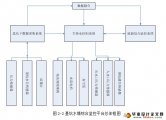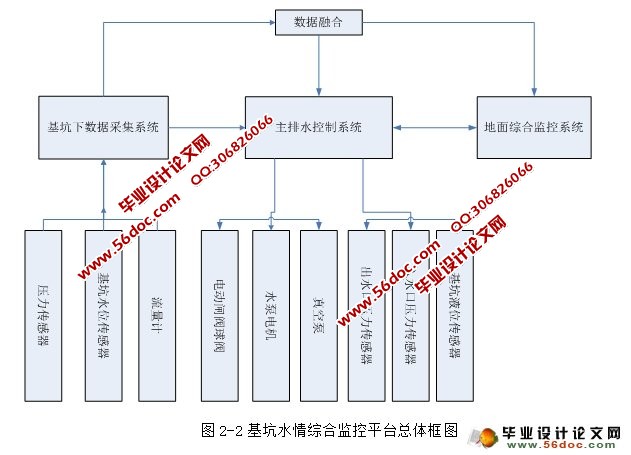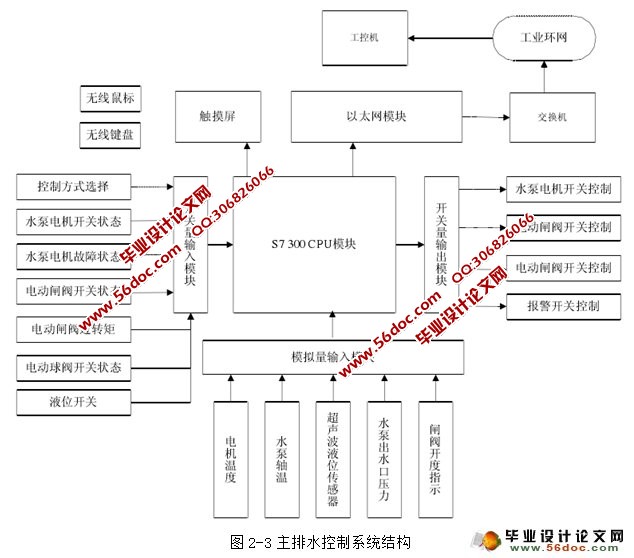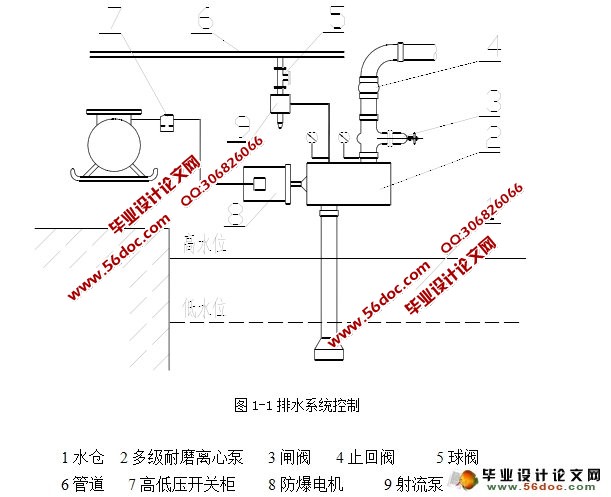基坑排水监控系统的设计及应用(任务书,开题报告,中期检查表,毕业论文24000字)
摘要
本课题针对现有排水系统存在的弊病,研究适用于基坑下使用的主排水监控系统。而主排水监控系统的核心技术是水泵控制装置。本课题设采用了西门子S7-300系列PLC作为中央控制单元,并扩展了必要的数字量输入输出模块、模拟量模块和通讯模块。本设计具有就地自动、就地手动、远程自动和远程手动四种控制方式,可以自由切换。并可在自动状态下,实时测量水仓水位,根据水位的变化情况,自动判断启动水泵的时间和台数。考虑到均匀磨损的原则及防止水泵长期不用因受潮锈死,设计有水泵轮换工作机制,使得每次启动水泵时,总是开启运行时间最少的水泵。
同时,系统利用嵌入式和多点接口技术,设计实现了显示屏与可编程控制器的可靠通信,触摸屏支持无线鼠标和键盘的操作功能。在基坑恶劣的环境下,操作人员只需根据水泵房水仓的实际情况及水泵运行参数,适时修改显示屏参数,就可完成整个系统的控制功能,从而方便了设备调试和维护,缩短了工作时间。
本课题研究的主排水系统具有以下特点:水位实时在线监测与显示;水泵自动启动与停止;支持利用无线鼠标和键盘进行现场调试功能;水泵采用轮班制,达到水泵均衡工作,提高水泵的使用寿命;设计了较完善的保护功能,如缺水保护、高温保护及过流保护等;该系统可与基坑地面监测中心联网,便于集中控制。
关键词:离心式水泵,可编程逻辑控制器,触摸屏,安全栅
Abstract
This issue exists for the shortcomings of the existing drainage system to study the foundation for the use of the main drainage control systems. The main drainage control system is the core technology of the pump control device. The project set up by the Siemens S7-300 series PLC as the central control unit, and extend the necessary digital input and output modules, analog modules and communication modules. This design has a place automatically, local manual, automatic and remote manual four kinds of remote control, you can freely switch. In the automatic mode can be real-time measurement of water storage level, according to water level changes, automatically determine the start time and sets the number of pumps. Taking into account the principle of uniform wear and to prevent long-term need due to damp rusty water pump died, the design of the working mechanism of the pump rotation, so every time you start the pump, always turn on the pump running time at least.
Meanwhile, the system uses embedded and multi-interface technology, designs and implements a reliable display and the programmable controller communication, touch screen support for the operation of the wireless mouse and keyboard functions. Harsh environment in the pit, the operator simply positions according to the water pump house and pump operating parameters of the actual situation, timely modify the display parameters, you can complete the whole system control functions to facilitate the commissioning and maintenance of equipment, reduced underground work time.
This study is the main drainage system has the following features: real-time online monitoring of water level and display; pump automatically starts and stops; supported the use of the wireless mouse and keyboard, on-site debugging; pump using a shift system, to pump a balanced work to improve the life of the pump ; design a more comprehensive protection features such as water protection, high temperature protection and over current protection, etc.; The system can be networked with the foundation ground monitoring center, to facilitate centralized control.
Keywords: centrifugal pump, a programmable logic controller, touch screen, barrier
目录
1概述 1
1.1基坑排水系统概述 1
1.1.1基坑排水的重要性 1
1.1.2主排水系统的组成 1
1.2现有基坑排水系统现状及存在的问题 3
1.2.1基坑排水系统现状 3
1.2.2基坑排水系统存在的问题 4
1.3国内外研究动态 4
1.4课题完成内容 5
2基坑排水系统总体方案设计 6
2.1可编程控制器的技术概述 6
2.1.1可编程控制器的产生和发展 6
2.1.2可编程控制器的特点 7
2.1.3可编程控制器的功能 8
2.2基坑排水系统的主体结构 9
2.2.1主排水系统的工艺流程 9
2.2.2引水装置 10
2.2.3泵站水锤及防护 10
2.3主排水系统控制方案 11
2.3.1控制原理 11
2.3.2系统结构 12
2.3.3系统功能 13
3 主排水系统硬件设计 16
3.1传感器系统设计 16
3.1.1水位传感器 17
3.1.2温度行传感器 18
3.1.3压力传感器 19
3.2电动阀门设计 19
3.3 PLC控制系统设计 21
3.3.1 PLC选型及硬件组态 21
3.3.2 CPU313C的原理及接线 24
3.3.3 SM321的原理及接线 24
3.3.4 SM331的原理及接线 26
3.3.5 PLC系统供电 28
4 主排水系统软件设计 29
4.1系统PLC程序设计 29
4.1.1排水模型及“避峰就谷” 29
4.1.2水泵的轮换工作的实现 31
4.1.3不同模式下水泵控制 34
4.1.4数据采集 36
4.1.5保护及报警 36
4.1.6系统时间的设定 36
4.2系统的人机交互界面设计 37
4.2.1 MCGS组态软件的体系结构 37
4.3触摸屏与PLC的通信实现 38
4.3.1 MPI通信原理 38
4.3.2 MPI通信参数设置 39
4.3.3建立实时数据库 39
5 总结和展望 41
参考文献 43
致谢 45
|







